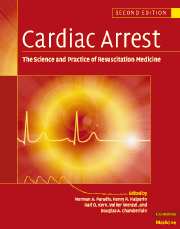Book contents
- Frontmatter
- Contents
- List of contributors
- Foreword
- Preface
- Part I Introduction
- Part II Basic science
- Part III The pathophysiology of global ischemia and reperfusion
- Part IV Therapy of sudden death
- Part V Postresuscitation disease and its care
- Part VI Special resuscitation circumstances
- 52 Prevention of sudden death in patients at risk: channelopathies and arrhythmic syndromes in the structurally normal heart
- 53 Pediatric cardiopulmonary resuscitation
- 54 Resuscitation in elder persons
- 55 Asphyxial cardiac arrest
- 56 Hemorrhagic shock and hypovolemic cardiac arrest
- 57 Cardiopulmonary resuscitation in hypothermic patients
- 58 Cardiac arrest due to poisoning
- 59 Cardiac arrest during anesthesia
- 60 Resuscitation of the pregnant patient suffering sudden cardiac death
- 61 Drowning
- 62 Anaphylactic shock
- 63 High altitude resuscitation
- 64 Electrical injuries
- 65 Rare syndromes, commotio cordis, sudden death in athletes
- Part VII Special issues in resuscitation
- Index
60 - Resuscitation of the pregnant patient suffering sudden cardiac death
from Part VI - Special resuscitation circumstances
Published online by Cambridge University Press: 06 January 2010
- Frontmatter
- Contents
- List of contributors
- Foreword
- Preface
- Part I Introduction
- Part II Basic science
- Part III The pathophysiology of global ischemia and reperfusion
- Part IV Therapy of sudden death
- Part V Postresuscitation disease and its care
- Part VI Special resuscitation circumstances
- 52 Prevention of sudden death in patients at risk: channelopathies and arrhythmic syndromes in the structurally normal heart
- 53 Pediatric cardiopulmonary resuscitation
- 54 Resuscitation in elder persons
- 55 Asphyxial cardiac arrest
- 56 Hemorrhagic shock and hypovolemic cardiac arrest
- 57 Cardiopulmonary resuscitation in hypothermic patients
- 58 Cardiac arrest due to poisoning
- 59 Cardiac arrest during anesthesia
- 60 Resuscitation of the pregnant patient suffering sudden cardiac death
- 61 Drowning
- 62 Anaphylactic shock
- 63 High altitude resuscitation
- 64 Electrical injuries
- 65 Rare syndromes, commotio cordis, sudden death in athletes
- Part VII Special issues in resuscitation
- Index
Summary
Clinical scenario: A 20-year-old pregnant woman is admitted to the emergency room having had a cardiac arrest at home. Cardiac massage and intubation had been performed at home with the patient in the left lateral position. An emergency Cesarean section takes place on the emergency room trolley in “not particularly aseptic conditions”, and a live infant is born. The mother 's cardiovascular system now responds to resuscitative measures. Three weeks later, after a stormy period in the intensive care unit, she is discharged to the ward with a left hemiparesis. Eighteen years later she sees her son get a place at university.
Introduction
Pregnancy places considerable stress on the cardiorespiratory system. Despite this, cardiac arrest is uncommon – Willis and Rees estimated it to occur once in approximately 30000 late deliveries, but survival from such an event is exceptional. The United Kingdom 's Confidential Enquiry into Maternal and Child Health (CEMACH), formerly known as the Confidential Enquiry into Maternal Deaths, reports that most maternal deaths are from acute causes, with many mothers receiving some form of resuscitation. Nevertheless, the number of indirect deaths (deaths from medical conditions exacerbated by pregnancy) is greater than that of deaths from conditions that arise from pregnancy itself. These indirect deaths seem to be increasing as a result of both social trends and medical progress. The advance of surgical procedures and medical treatments has meant that women who previously would not have survived to adulthood may now reach pregnancy.
- Type
- Chapter
- Information
- Cardiac ArrestThe Science and Practice of Resuscitation Medicine, pp. 1076 - 1087Publisher: Cambridge University PressPrint publication year: 2007



